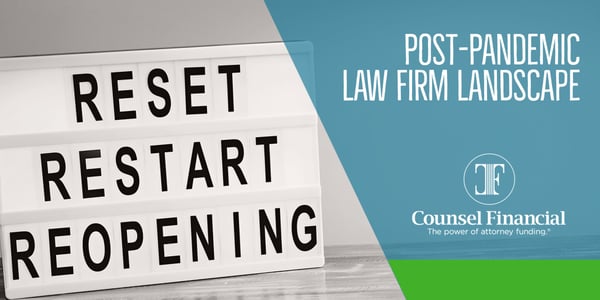One Year Later: How a Year of Pandemic has Affected the American Law Firm

 As the legal system continues to adapt to the constant change brought about by the global pandemic, many law firms are looking ahead to plan for the future. We explore how law firms have changed and what modifications are here to stay in our new series, Post-Pandemic Law Firm Landscape. Hear firsthand from plaintiffs firms on how they've navigated the current state of the legal system and their outlook moving forward.
As the legal system continues to adapt to the constant change brought about by the global pandemic, many law firms are looking ahead to plan for the future. We explore how law firms have changed and what modifications are here to stay in our new series, Post-Pandemic Law Firm Landscape. Hear firsthand from plaintiffs firms on how they've navigated the current state of the legal system and their outlook moving forward.
We recently spoke to Kristy Arevalo, Esq. of McCune Wright Arevalo, LLP to discuss how her firm is looking ahead as the country works toward reopening.
CFS: As we approach the one-year mark of COVID-19 regulations and closures impacting the court system, how has your firm changed in the last 12 months? Have there been any COVID-related adaptations that you think will become permanent additions to the way your firm is run?
KA: COVID has massively changed my personal work schedule! Looking back to last year, I was traveling for work, if not every week, then every other week, crisscrossing the country for depositions, meetings and court appearances. To be honest, I was almost reaching a burn out point with the constant travel and intense work. After almost a year of no travel, and relying on virtual methods for meetings and depositions, it’s amazing to me all the time that was wasted on airplanes and in airports.
When the pandemic started, our firm was in a big growth phase and like everyone at that time, we had moments where we were concerned about the future, because justice literally came to a halt when courts closed across the country. As soon as we understood the severity of the pandemic in March, we decided to go fully remote. Because we are based in California and California has one of the highest rates of infection in the country, we never really went back into the office. I think now, our firm has reached a comfort level about working from home and, so far, I’ve been able to keep my team accountable through time records and monthly Zoom meetings.
What’s really been interesting for me is that we hired a new associate while we’ve been remote and initially, I worried a little bit about how I was going to be able to mentor her and help her learn without being in the same office together. So, I told her to jump on any Zoom depositions I have and just observe. Six months into her employment, she has told me that she learned so much by observing me and, had this been before COVID, she never would have had the opportunity to be involved in meetings and depositions with me because I would have been in another state taking them.
CFS: With the COVID-19 vaccine becoming more widely available, many are starting to see the light at the end of the tunnel. What is your outlook at this point in the pandemic? What is your firm’s plan moving forward as things begin to settle back into relative normalcy?
KA: To be honest, there are days when I hate Zoom and I miss going back into the office or being able to do an in-person deposition, but I have to say I like the flexibility that working from home has brought. So, do I think things will go back to how they were before the pandemic? I think most people will apply a hybrid method and as things calm down over time, I think people will start traveling more and courts will start demanding in-person appearances again. However, I do think that Zoom depositions will be here to stay and that people will not be returning to the same level of travel as before because it’s truly unnecessary.
For our firm, I think once everything gets back to more “normal,” we will be implementing a hybrid policy where we are giving people the option of working from home a few days a week and coming into the office the other days. However, I would like to mention the ripple effect that working from home and reduction in business travel has on smaller businesses in various industries that rely on people getting dressed up and going into the office or rely on business travelers. When the pandemic first started and everything was totally shut down, there was a real fear of “how are we going to get through this” so I looked into our firm’s business insurance policy and was shocked to see that there was almost a complete exclusion for any type of virus or outbreak like this, and I know that that exclusion really hurt a lot of small businesses.
CFS: The COVID-19 pandemic changed the way we work in many ways and has forced many to reexamine the way they run their law firms. Has the pandemic, and the changes brought to the American workplace, changed the way you believe a successful law firm can be run?
KA: Yes, the pandemic definitely has changed the way I think a successful law firm can be run. With our firm, and I’m sure it’s the same with many other firms, after seeing how well our team works remotely, we have been able to take on new attorneys who live outside our geographic area who will continue to mainly work remotely even after the pandemic is over. So, whereas before the pandemic, we really wouldn’t consider hiring someone who lived in another city or who lived too far away from the office unless they were willing to relocate, now because working remotely is an option, we have a much larger talent pool to hire from.
In this age, where everything can be done online so easily you have to stop and think, why do we have to follow this antiquated routine of going into an office for a set time? I think if you’re hiring quality people and you can trust them, why not let them work from home with a more flexible schedule? When people are working from home, and I know I’ve seen this with myself, they are more focused when they are working because the typical distractions of the office setting aren’t there, like ringing phones and people stopping in to chat or ask a question.
CFS: In recent years we have seen an increase in the role of women in leadership positions in mass torts with many judges, like Judge Martinotti in the Elmiron MDL, making a point to appoint a diverse plaintiff steering committee. What changes have you seen in the role of women in the legal community in recent years? Do you think the COVID-19 pandemic will bring further changes?
KA: I’ve seen a lot of positive changes in the last year especially. I try to act as a mentor to the younger female associates at my firm and this past summer, when I was working on the Essure litigation mediation, I made it a point to bring them with me so they could get exposure to something like that. Honestly, I didn’t know what everyone at the mediation was going to say, but everyone was great and the judge even commended me for including my younger associates. Often times it’s the younger associates who put in a ton of hours on a case but don’t get to be in the spotlight at the mediation or the trial.
I saw the leadership appointments in the Elmiron litigation and I think that’s so great that judges are making an effort to create more diverse leadership committees. However, I do worry that it will turn into a tokenism situation. I would hate to see firms thinking ‘we want a seat on leadership so we need to throw the token woman into the ring.’ As far as the pandemic’s effect on bringing further changes to women working in the legal industry, or any industry really, I think women are working harder than ever to keep up now that they are working remotely with kids also at home, trying to figure out remote learning.
Counsel Financial provides working capital credit lines exclusively for the plaintiffs' bar in all states except California, where credit lines are issued by California Attorney Lending.


